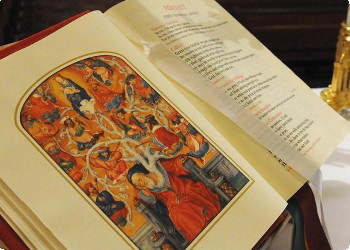But he realized their intentions
Col 1,24-2,3; Ps 61; Lk 6,6-11
9 SEPTEMBER
Jesus is perennially under the tent of light of the Holy Spirit. He knows what is in every heart and according to this knowledge he always gives a word full of all wisdom, truth, light, prudence and holiness. The Gospel attests this truth. It is in every page. If Jesus had not spoken from full and perfect knowledge of the heart of man, he would have been stoned from the first day of his mission. Scribes and Pharisees saw him as the great destroyer of their false, immoral and deceptive religion. They considered him a true impostor. Their religion was untouchable, unmodifiable and non-criticizable. Everyone had to conform to it.
While he was in Jerusalem for the feast of Passover, many began to believe in his name when they saw the signs he was doing. But Jesus would not trust himself to them because he knew them all, and did not need anyone to testify about human nature. He himself understood it well (Jn 2,23-25). When the people saw the sign he had done, they said, “This is truly the Prophet, the one who is to come into the world.” Since Jesus knew that they were going to come and carry him off to make him king, he withdrew again to the mountain alone (Jn 6,14-15). Jesus answered them, “Did I not choose you twelve? Yet is not one of you a devil?” He was referring to Judas, son of Simon the Iscariot; it was he who would betray him, one of the Twelve (Jn 6,70-71). Before the feast of Passover, Jesus knew that his hour had come to pass from this world to the Father. He loved his own in the world and he loved them to the end. The devil had already induced Judas, son of Simon the Iscariot, to hand him over. So, during supper, fully aware that the Father had put everything into his power and that he had come from God and was returning to God, he rose from supper and took off his outer garments. He took a towel and tied it around his waist. Then he poured water into a basin and began to wash the disciples’ feet and dry them with the towel around his waist (Jn 13,1-5).
When the Pharisee who had invited him saw this he said to himself, “If this man were a prophet, he would know who and what sort of woman this is who is touching him, that she is a sinner.” Jesus said to him in reply, “Simon, I have something to say to you.” “Tell me, teacher,” he said. “Two people were in debt to a certain creditor; one owed five hundred days’ wages and the other owed fifty. Since they were unable to repay the debt, he forgave it for both. Which of them will love him more?” Simon said in reply, “The one, I suppose, whose larger debt was forgiven.” He said to him, “You have judged rightly” (Lkc 7,39-43). They posed this question to him, “Teacher, we know that what you say and teach is correct, and you show no partiality, but teach the way of God in accordance with the truth. Is it lawful for us to pay tribute to Caesar or not?” Recognizing their craftiness he said to them, “Show me a denarius; whose image and name does it bear?” They replied, “Caesar’s.” So he said to them, “Then repay to Caesar what belongs to Caesar and to God what belongs to God.” They were unable to trap him by something he might say before the people, and so amazed were they at his reply that they fell silent (Lk 20,21-26).
Today Jesus must act with great prudence, intelligence and wisdom. This is why he draws on his side the people that is in the synagogue. He makes it clear to it that good can always be done, even on a Sabbath. There is no day when good cannot be done. Having attracted people on his side, he performs the great miracle, only by saying a word.
On another Sabbath he went into the synagogue and taught, and there was a man there whose right hand was withered. The scribes and the Pharisees watched him closely to see if he would cure on the Sabbath so that they might discover a reason to accuse him. But he realized their intentions and said to the man with the withered hand, “Come up and stand before us.” And he rose and stood there. Then Jesus said to them, “I ask you, is it lawful to do good on the Sabbath rather than to do evil, to save life rather than to destroy it?” Looking around at them all, he then said to him, “Stretch out your hand.” He did so and his hand was restored. But they became enraged and discussed together what they might do to Jesus.
To these Pharisees one could also object: “You say so many vain, useless, foolish, frivolous, often sinful words and do not sin, on Sabbaths. You consider yourselves right, even holy. Why if I, Jesus, say a Word of truth, justice and healing should I sin? If my Word is a sin, infinitely more sin is your word”.
Mother of God, Angels and Saints, give us the holy discernment of good and evil.





